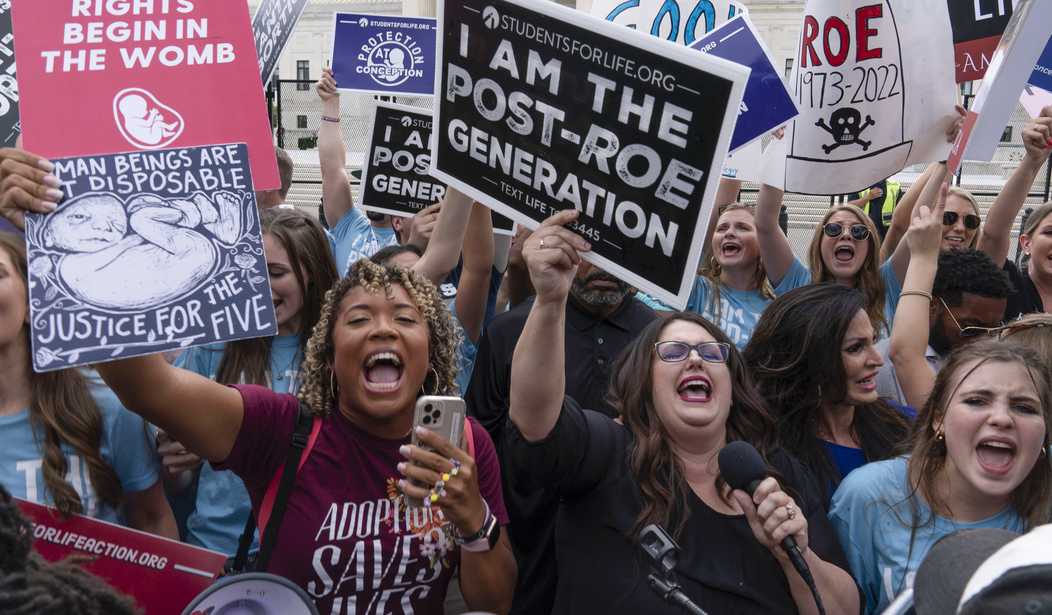Did the Supreme Court change the midterm field in its Dobbs decision to overturn Roe and send abortion policy back to legislatures? Ever since the leak of the opinion in early May, Democrats — and no small number of Republicans — believed that anger over the decision could reinvigorate Democrat voters and blunt the outcome of the “red wave” that had been forming.
Generic congressional ballot polling hasn’t shown that dynamic developing, at least not in aggregation, but those polls would only show that indirectly. Marquette decided to conduct a survey that tested the question more directly, and got some surprising results. For the most part, nothing changed over the last two months — but what did change was the surprise:
A new Marquette Law School Poll national survey finds little evidence that partisan motivation to vote in the 2022 elections has been altered by the Supreme Court decision overturning Roe v. Wade, which had established a right to an abortion. There has been much speculation that this June decision, in Dobbs v. Jackson Women’s Health Organization, would change the November outlook.
Yet a comparison of the Marquette Law School Poll’s May and July national survey data finds few elements of change in motivation to vote or in vote choice, despite a substantial drop in public approval of the Court’s handling of its job and a majority of the public opposed to the Court’s decision in Dobbs.
This matches up with the data we’ve seen in RCP and FiveThirtyEight aggregations. Both have shown a remarkably stable trend in overall generic-ballot polling, giving Republicans a slight edge where the GOP only needs to be within five points of Democrats to succeed. Both series have narrowed slightly over the last week, but that appears to relate more to the timing of surveys that have long shown Democrat-favorable results.
In fact, Marquette found that the only measurable impact from Dobbs gives the GOP another edge in the upcoming midterms, not Democrats:
The July results show that Republicans have slightly increased their advantage over Democrats in enthusiasm and projected turnout, compared to May, as shown in Table 2. In July, the percentage of Republicans very enthusiastic to vote rose 8 percentage points, while enthusiasm rose 3 percentage points among Democrats. Similarly, the percentage saying they are certain to vote in November rose 5 percentage points among Republicans but 2 percentage points among Democrats.
The enthusiasm gap between the parties is a substantial 18-percentage-point Republican advantage, while the certainty of voting shows a smaller 5-point Republican edge.
The changes reported by Marquette aren’t dramatic, but they do exceed the ±4% margin of error when it comes to GOP enthusiasm. The change to Democrat and independent enthusiasm was strictly within the MoE, but it’s still worth noting that enthusiasm actually dipped slightly win indies, going down one point to 50%.
Enthusiasm for midterm voting didn’t change much on the basis of Roe position — in fact, it didn’t change at all from early May. It may well be that the leak on May 3, a week before the start of the earlier survey period, had already solidified that position. However, the certainty of voting did change slightly in the two months afterward … but once again, in favor of the pro-lifers:

Looking through the rest of the results, it’s remarkable how little has actually changed after Dobbs, politically speaking. Attitudes on abortion haven’t changed at all, which shouldn’t surprise too many people. Attitudes on this policy only change over long periods of time, and two months is far too short. What does become apparent is that the Democrats’ policy of unrestricted abortion didn’t get more popular after Dobbs, and neither did the GOP’s position of banning it altogether. The most significant shift in the policy was still within the MoE, a three-point shift in favor of a 15-week ban, which went from 50/49 in early May to 53/46 this month.
Here’s one way Republicans can still screw this up, however. Some states are flirting with the obviously unconstitutional idea of banning interstate travel to access abortions. Not only is that bad law — states don’t regulate interstate travel under the Constitution — it’s a very bad idea politically as well:

There is literally no majority constituency for this idea, at least nationally. Nor should there be; states have no jurisdiction for blocking interstate travel except in cases where specific parole and bail conditions apply. This is an idiotic idea that should be rapidly discarded wherever it momentarily emerges.
Otherwise, though, Republicans appear to have less to fear from Dobbs than they feared and Democrats hoped. And that’s even apart from the fact that this election will be about inflation, the economy, crime, and Joe Biden — not abortion, not January 6, and not any of the other distractions that Democrats are desperately raising to deflect from their utter catastrophic failure over the last 18 months.








